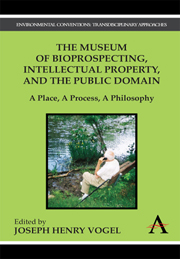 The Museum of Bioprospecting, Intellectual Property, and the Public Domain
The Museum of Bioprospecting, Intellectual Property, and the Public Domain Book contents
- Frontmatter
- Contents
- List of Figures
- Preface
- Acknowledgements
- Introduction: The Bauplan
- Chapter 1 Looking the Gorgon in the Face
- Chapter 2 Museums as Venues for Polemics
- Chapter 3 The Museum as a Vehicle for Considered Judgments on Access and Benefit Sharing
- Chapter 4 Clearing the Air: Applying the Intellectual Property Framework to National, Community, and Individual Rights in The Convention on Biological Diversity
- Chapter 5 The Anti-Commons Threat to Farmers' Rights: The Case of Crop Germplasm
- Chapter 6 The Moral Foundations of Intellectual Property and Conservation through Access and Benefit-Sharing
- Conclusions: The Nameless Interloper in The Museum of Bioprospecting, Intellectual Property, and the Public Domain
- Appendix: The Original Essay: A Proposal Based on “The Tragedy of the Commons:” Museum of Bioprospecting, Intellectual Property Rights, and the Public Domain
- Notes
- Index
Chapter 2 - Museums as Venues for Polemics
Exhibits that Provoke Controversy, Argumentation or Refutation
Published online by Cambridge University Press: 05 March 2012
- Frontmatter
- Contents
- List of Figures
- Preface
- Acknowledgements
- Introduction: The Bauplan
- Chapter 1 Looking the Gorgon in the Face
- Chapter 2 Museums as Venues for Polemics
- Chapter 3 The Museum as a Vehicle for Considered Judgments on Access and Benefit Sharing
- Chapter 4 Clearing the Air: Applying the Intellectual Property Framework to National, Community, and Individual Rights in The Convention on Biological Diversity
- Chapter 5 The Anti-Commons Threat to Farmers' Rights: The Case of Crop Germplasm
- Chapter 6 The Moral Foundations of Intellectual Property and Conservation through Access and Benefit-Sharing
- Conclusions: The Nameless Interloper in The Museum of Bioprospecting, Intellectual Property, and the Public Domain
- Appendix: The Original Essay: A Proposal Based on “The Tragedy of the Commons:” Museum of Bioprospecting, Intellectual Property Rights, and the Public Domain
- Notes
- Index
Summary
Museologists will be intrigued by the proposed Museum of Bioprospecting, Intellectual Property, and the Public Domain (MUBIO). An eclectic group of scholars from far a field has unknowingly responded to the 1972 clarion call of Duncan Cameron in “The Museum: A Temple or The Forum.” Cameron wrote that museums should be forums “unfettered by convention and established values” which could “ensure that the new and challenging perceptions of reality, the new values and their expressions, can be seen and heard by all.” Cameron contrasted his vision with the traditional notion of the museum as a temple, characterized by the display of “a structured sample of reality” that functioned “as an objective model against which to compare individual perceptions.” Over the last three decades, the Cameron paradigm has steadily gained acceptance among museologists. It is echoed in a number of proposals which would recast museums as spaces for dialogue in which “diverse communities might learn about and debate issues of contemporary relevance and importance.” Beyond the academic world, there is also acceptance. For example, the museum consultant Gaby Porter criticizes museums for claiming objectivity (“this is how it was”) and advises that exhibits probe opinions and promote questioning. To achieve an atmosphere of debate, the museologist Robert Lumley notes “[museums must first] free themselves of the taboos which make them avoid risky and controversial subjects in the name of their authority.”
- Type
- Chapter
- Information
- The Museum of Bioprospecting, Intellectual Property, and the Public DomainA Place, A Process, A Philosophy, pp. 17 - 28Publisher: Anthem PressPrint publication year: 2010


